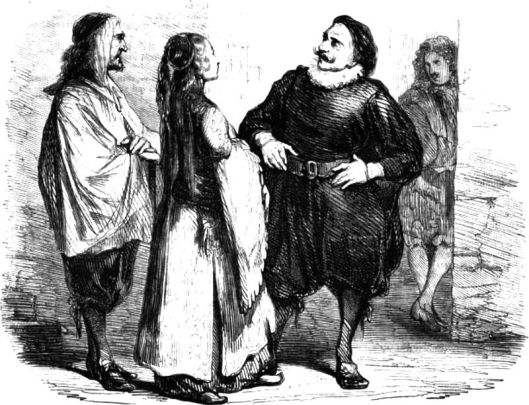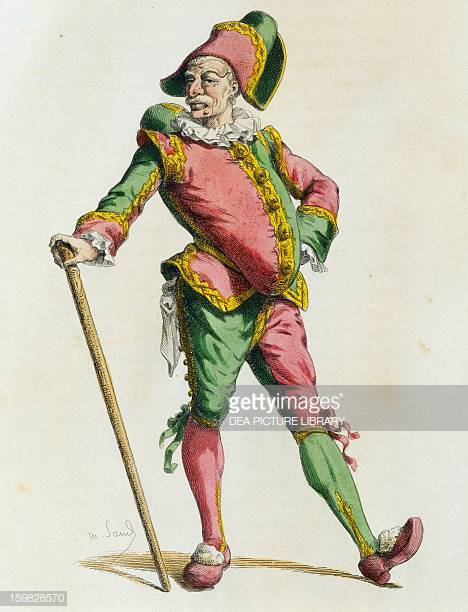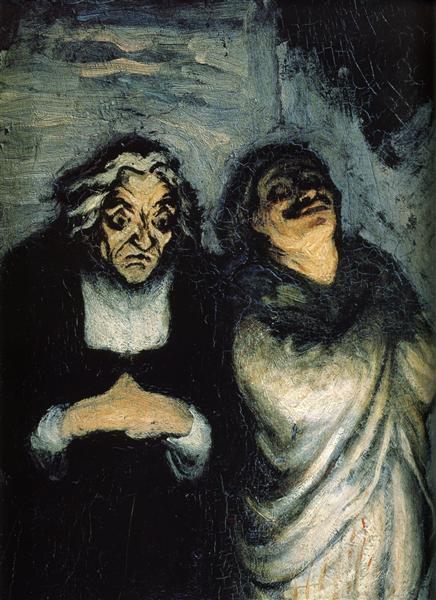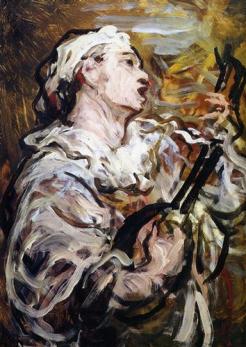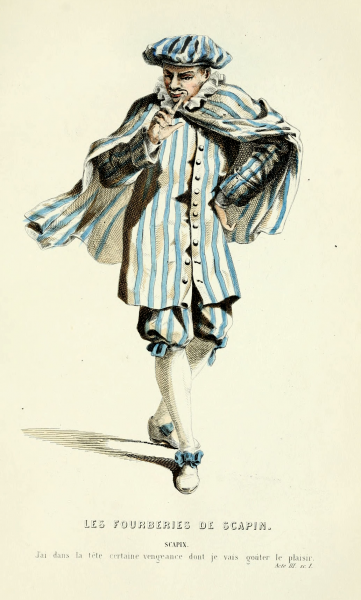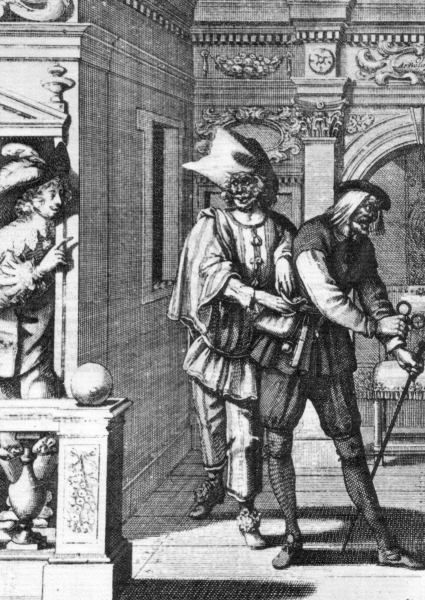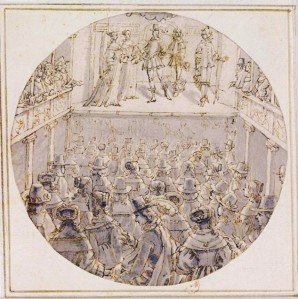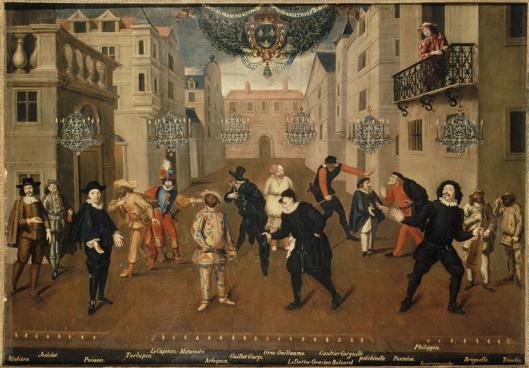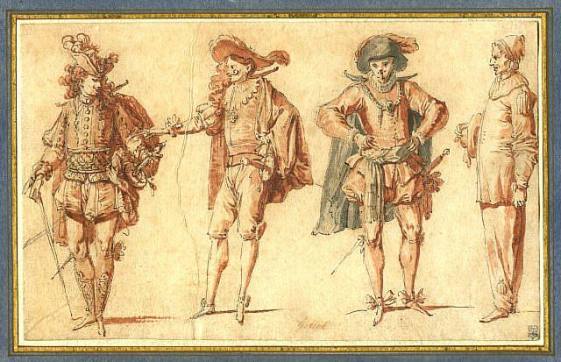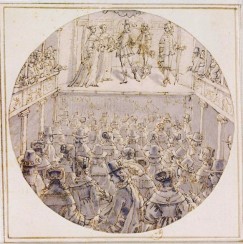
L’Étourdi par Horace Vernet (theatre-documention.com)
—ooo—
Dramatis Personæ (the cast)
LÉLIE, (son of) fils de Pandolphe.
CÉLIE, (slave to) esclave de Trufaldin.
MASCARILLE, (lackey to) valet de Lélie.
HIPPOLYTE, (daughter of) fille d’Anselme.
ANSELME, (old man) vieillard.
TRUFALDIN, vieillard.
PANDOLPHE, vieillard.
LÉANDRE, (son) fils de famille.
ANDRÈS, (believed to be) cru égyptien.
ERGASTE, valet.
UN COURRIER.
DEUX TROUPES DE MASQUES.
The scene is in Messina

Molière © SUPERSTOCK – SIPA
ACT FOUR
We will now read the remainder of Molière’s L’Étourdi, The Blunderer.
- a doubling
Lélie always crosses Mascarille’s plan, but Molière has built a sub-plot which could be called a doubling. However, the rules of classical theater demand that elements of the play be introduced in Act One. No one knows Célie’s identity, which points to a discovery, an anagnorisis. Mascarille, however, knows details of Trufaldin’s life. There will be a discovery that will allow Lélie and Célie to marry. The play is entitled L’Étourdi ou les contretemps. Contretemps are unexpected events. Lélie blunders, but he is often misled by appearances and by his beliefs. We have seen that he will not allow Léandre to look upon Célie has a loose woman.
The beginning of Célie’s story
Almost as soon as the curtain lifts, we learn that Trufaldin’s slave, Célie, has parents. She is very beautiful, but Lélie, who is in love with her and knows her heart, suspects that she is of higher birth. Molière makes room for a redeeming recognition.
Pour moi, dans ses discours, comme dans son visage,/ Je vois pour sa naissance un noble témoignage,/ Et je crois que le Ciel dedans un rang si bas,/ 30 Cache son origine, et ne l’en tire pas.
Lélie à Mascarille (I. ii)
[For my part, in her conversation as well as in her countenance, I see evidence of her noble birth. I believe that Heaven has concealed a lofty origin beneath such a lowly station.]
Lélie to Mascarille (I. 2, p. 10).
When Lélie and Mascarille go to Trufaldin’s house to know their fortune and be certain Célie’s feelings are compatible with Lélie’s, Célie reassures Lélie, saying, however, that her heart has not hurt anyone:
Mon cœur, qu’avec raison votre discours étonne,/ N’entend pas que mes yeux fassent mal à personne;/ Et si dans quelque chose, ils vous ont outragé,/ Je puis vous assurer que c’est sans mon congé.
Célie à Lélie (I. iii)
[My heart, which has good reason to be astonished
at your speech, does not wish my eyes to injure any one;
if they have offended you in anything, I can assure you I did not intend it.]
Célie to Lélie (I. iii, p. 12)
When Trufaldin realizes that Célie is outdoors, he tells her that she is not allowed to leave the house. She comments that a long time ago, she knew this fine man, suggesting a life gone bye: autrefois (in the past).
Autrefois j’ai connu cet honnête garçon ;
130 Et vous n’avez pas lieu d’en prendre aucun soupçon.
Célie à Trufaldin (I. iv)
[I was once acquainted with this respectable young man; You have no reason to be suspicious of him.]
Célie to Trufaldin (I. iv, p. 12)
Moreover, there is a ring.
Cette bague connue,
Vous dira le sujet qui cause ma venue.
Mascarille à Trufaldin (II. ix)
[This ring, which you know, will inform you what business brings me hither.]
Mascarille to Trufaldin (II. 2, p. 12)
This is the ring he is to take to Nérine as a token of Anselme’s love.
Et l’on m’a mis en main une bague à la mode,/ Q’après vous payerez si cela l’accommode.
Mascarille à Anselme (I. iii, v. 254)
[No, there is no need of your money ; without troubling yourself, I will make her a present ; a fashionable ring has been left in my hands, which you may pay for afterwards, if it fits her.]
Mascarille to Anselme (I. 6, p. 16)
Lélie has a courier bring a letter in which a Spanish nobleman states that he is travelling to take his daughter back to Spain. Although Mascarille has the ring, Trufaldin believes the courier. There is a past, an autrefois.
The Visit to Trufaldin’s
In Act Four, Scene One, Mascarille tells Lélie, as much as he knows about Zanobio Ruberti. He and Lélie will have dinner with Trufaldin and Célie. As the image at the top of this post reveals, Lélie is disguised as an Armenian. He has to learn a role, but Lélie doesn’t think he needs tutoring.
Ces répétitions ne sont que superflues;/ Dès l’abord mon esprit a compris tout le fait.
Lélie à Mascarille (IV. i)
[These repetitions are superfluous. From the very beginning I understood it all.]
Lélie to Mascarille (IV. 1, p. 50)
They aren’t. Lélie cannot remember that he parted with Trufaldin’s son in Tunis. He says Turin. Consequently, Trufaldin knows Lélie has not met his son. This “comedy” incurs Trufaldin’s wrath because it is cruel. Moreover, Lélie cannot keep his eyes from admiring Célie and in the process, he pays no attention to Trufaldin’s niece Jeannette. This is yet another blunder. Therefore, Trufaldin has a stick made from an old oak tree. Lélie will be beaten and Mascarille joins in to keep his cover. Others must believe he is a friend.
We skip Scene Three because we have read Anselme on Love (4).
Blunders or Fate
In Scene Four, Lélie states that love misguides him and that Mascarille doesn’t know its force:
Qu’il est aisé de condamner des choses/ Dont tu ne ressens point les agréables causes!/ Je veux bien néanmoins, pour te plaire une fois,/ Faire force à l’amour qui m’impose ses lois./ Désormais…
Lélie à Mascarille (IV. iv)
[Lack-a day! how easy it is for you to condemn things of which you do not feel the enchanting cause. In order to humour you for once I have, nevertheless, a good mind to put a restraint upon that love which sways me.
Henceforth . . .]
Lélie to Mascarille (IV. 5)
Lélie also feels that his fate is cruel.
Faut-il que le malheur qui me suit à la trace/ Me fasse voir toujours disgrâce sur disgrâce.
Lélie, seul (IV. vi, v. 1635)
[Will ill-luck always follow me, and heap upon me one misfortune after another?]
Lélie, alone (IV. 8, p. 58)
A Second Rival: Andrès
In Scene Seven, Ergaste tells Mascarille that a young man, an Egyptian whose skin is white and seems prosperous, and an old woman have arrived.
À l’heure que je parle, un jeune Égyptien,/ Qui n’est pas noir pourtant, et sent assez son bien,/ Arrive, accompagné d’une vieille fort hâve,/ Et vient chez Trufaldin racheter cette esclave/ Que vous vouliez; pour elle il paraît fort zélé.
Ergaste à Mascarille (IV. vii)
[At the very moment I am talking to you, a young gipsy, who nevertheless is no black, and looks like a gentleman, has arrived with a very wan-looking old woman, and is to call upon Trufaldin to purchase the slave you wished to redeem. He seems to be very anxious to get possession of her.]
Ergaste to Mascarille (IV. 9, p. 59)
Lélie blundered, but destiny is unkind to both Lélie and Mascarille.
Lorsqu’un rival s’éloigne, un autre plus funeste/ S’en revient enlever tout l’espoir qui nous reste.
Mascarille à Ergaste (IV. vii)
[As soon as one rival withdraws, another and a more dangerous one starts up to destroy what little hope there was left. However, by a wonderful stratagem, I believe I shall be as left.]
Mascarille to Ergaste (IV. 9, p. 59)
Yet Mascarille comes up with a new stratagem. There has been a theft, so he will bribe some officers who will imprison all gypsies, including Andrès.
1665 Il s’est fait un grand vol, par qui, l’on n’en sait rien;/ Eux autres rarement passent pour gens de bien:/ Je veux adroitement sur un soupçon frivole,/ Faire pour quelques jours emprisonner ce drôle;/ Je sais des officiers de justice altérés …
Mascarille à Ergaste (IV. vii, v 1663-)
[A great robbery has lately been committed, by whom, nobody knows. These gipsies have not generally the reputation of being very honest; upon this slight suspicion, I will cleverly get the fellow imprisoned for a few days. I know some officers of justice, open to a bribe, who will not hesitate on such an occasion ; greedy and expecting some present, there is nothing they will not attempt with their eyes shut; be the accused ever so innocent, the purse is always criminal, and must pay for the offence.]
Mascarille to Ergaste (IV. 9. p. 60)
This stratagem could have worked, but Lélie will not let anyone imprison a “respectable” man. Andrès is not a gypsy.
Par les soins vigilants de l’exempt balafré,/ Ton affaire allait bien, le drôle était coffré,/ Si ton maître au moment ne fût venu lui-même,/ 1680 En vrai désespéré rompre ton stratagème: «Je ne saurais souffrir, a-t-il dit hautement,/ Qu’un honnête homme soit traîné honteusement;/ J’en réponds sur sa mine, et je le cautionne»:/ Et comme on résistait à lâcher sa personne,/ 1685 D’abord il a chargé si bien sur les recors,/ Qui sont gens d’ordinaire à craindre pour leurs corps,/ Qu’à l’heure que je parle ils sont encore en fuite,/ Et pensent tous avoir un Lélie à leur suite.
Ergaste à Mascarille (V.I, v. 1677-)
[The constable took great care everything was going on smoothly; the fellow would have been in jail, had not your master come up that very moment, and, like a madman spoiled your plot. “I cannot suffer,” says he in a loud voice, “that a respectable man should be dragged to prison in this disgraceful manner; I will be responsible for him, from his very looks, and will be his bail.”]
Ergaste to Mascarille (V.I, p. 60)
Andrès buys Célie, who once loved him, and is about to take her away. She persuades Andrès to defer their trip because she has a violent headache and would like to rest until it has abated. Mascarille quickly turns himself into a Swiss who can rent a house he has quickly transformed into an inn by posting a sign. Mascarille once planned to take Célie to the same house while Léandre negotiated marrying Célie with his father.
This stratagem may also have worked, but enters Lélie who learns from Andrès that he has bought Célie who is resting in a house that belongs to Lélie’s father and is looked after by Mascarille. He believes Andrès will let him marry Célie, but Andrès has other plans.
The Anagnorisis
At this point, nothing can be done. The laws of comedy, its formulaic happy ending, and the hand of destiny must rescue Lélie.
In Scene Five, Lélie asks Mascarille to shed his disguise. He thinks matters have been dealt with. We revisit Act One, Scene Four where Lélie believes that all that remains to be done is negotiating the price that will allow him to marry Célie. Similarly, five acts later, Lélie believes Andrès will let him marry the woman he loves: Célie. He doesn’t know how to thank Andrès who tells him not to thanks him.
Non, ne m’en [remerciements] faites point, je n’en veux nullement.
Andrès à Lélie (V.iv, v. 1806)
[No, give me none ; I will have none.]
Andrès to Lélie (V. 6, p. 164)
In Scene Five, speaks about his success to Mascarille. He is proud.
J’aurai c’est honneur d’avoir fini l’ouvrage.
Lélie à Mascarille (V.v, v. 1835)
Soit; vous aurez été bien plus heureux que sage.
Mascarille à Lélie (V.v, v. 1836)
[… mine will be the honour of having finished the work.]
Lélie to Mascarille (V. 9, p. 65)
[You have been more lucky than wise.]
Mascarille to Lélie (V. 9, p. 65)
In Scene Six, Andrès says that he will not give Célie to Lélie
1841 Mais enfin, ce bienfait aurait trop de rigueur,
S’il fallait le payer aux dépens de mon cœur ;
Jugez, dans le transport où sa beauté me jette
Si je dois à ce prix vous acquitter ma dette …
Andrès à Lélie (V.vi)
[… but this kindness would be too dearly bought were I to repay it at the expense of my heart. Judge, by the rapture her beauty causes me, whether I ought to discharge my debt to you at such a price.]
Andrès to Lélie (V. 9, p. 65)
Dénouement
- Hippolyte and Célie
- the gypsies fighting: good and bad
- the Egyptian woman recognizes Zanobio Ruberti, Célie’s real father
- Andrès has also found his father: Zanobio Ruberti
Hippolyte has joined the group. She tells Célie that her beauty has stolen hearts. She has lost Léandre. She can tell, however, the “irresistible sway of your [Célie’s] charms.” She does not begrudge Célie. In fact, she has not lost Léandre. It is Célie who has lost Lélie.
The moment we have awaited has come. Mascarille tells in a récit that a bad gypsy had taken Célie from her. These two gypsy women have just had a terrible fight. One was the woman who stole Célie and the other, the good gypsy, or the woman who has been looking for Zanobio Ruberti and finds him:
« C’est vous, si quelque erreur n’abuse ici mes yeux,/ Qu’on m’a dit qui viviez inconnu dans ces lieux»,/ A-t-elle dit tout haut, « ô! rencontre opportune!/ 1960 Oui, seigneur Zanobio Ruberti, la fortune/ Me fait vous reconnaître …
Votre femme, je crois, conçut tant de douleur,/ Que cela servit fort pour avancer sa vie:/ Si bien qu’entre mes mains cette fille ravie,/ Me faisant redouter un reproche fâcheux,/ Je vous fis annoncer la mort de toutes deux:/…
1975 Mais il faut maintenant, puisque je l’ai connue,/ Qu’elle fasse savoir ce qu’elle est devenue ; Au nom de Zanobio Ruberti, que sa voix…
Mascarille/l’Égyptienne (V.ix, v. 1955- )
[“It is you, unless my sight misgives me, who, I was informed, lived privately in this town; most happy meeting! Yes, Signer Zanobio Ruberti, fortune made me find you out at the very moment I was giving myself so much trouble for your sake.”
(…)
but now, as I have found out the thief, she must tell us what has become of your child.”]
Mascarille/l’Égyptienne (V. 14)
Hearing Trufaldin’s real name, Andrès realizes that Trufaldin is Zanobio Ruberti and tells him that he has found his father.
Au nom de Zanobio Ruberti, que sa voix …
[At the name of Zanobio Ruberti …]
Horace/Andrés
1983 Oui, mon père, je suis Horace votre fils,/ D’Albert qui me gardait les jours étant finis,/ Me sentant naître au cœur d’autres inquiétudes/ Je sortis de Bologne, et quittant mes études,/Portai durant six ans mes pas en divers lieux,/ Selon que me poussait un désir curieux …
Andrès à Trufaldin (V. ix, v. 1983 – )
[I am Horatio, your son; my tutor, Albert, having died, I felt anew certain uneasiness in my mind, left Bologna, and abandoning my studies, wandered about for six years in different places, according as my curiosity led me.]
Andrès à Trufaldin(V. 14, p. 68)
The Consequences: marriages
Enfin, pour retrancher ce que plus à loisir,/ Vous aurez le moyen de vous faire éclaircir,/ Par la confession de votre Égyptienne,/ Trufaldin maintenant vous reconnaît pour sienne; / 2005 Andrès est votre frère; et comme de sa sœur/ Il ne peut plus songer à se voir possesseur,/ Une obligation qu’il prétend reconnaître,/ A fait qu’il vous obtient pour épouse à mon maître;/ Dont le père témoin de tout l’événement,/ 2010 Donne à cette hyménée un plein consentement …
Mascarille, surtout (V.ix)
[… in one word (to tell you shortly that which you will have an opportunity of learning afterwards more at your leisure, from the confession of the old gipsywoman), Trufaldin owns you (to Celia) now for his daughter; Andres is your brother; and as he can no longer think of marrying his sister, and as he acknowledges he is under some obligation to my master, Lelio, he has obtained for him your hand. Pandolphus being present at this discovery, gives his full consent to the marriage; and to complete the happiness of the family, proposes that the newly-found Horatio should marry his daughter. See how many incidents are produced at one and the same time!
Mascarille, mostly (V. 14, p. 68)
Lélie will marry Célie. As for his rival Léandre, he apologizes to Hippolyte who crave[s] “nothing but a generous pardon.” As for Andrès/Horatio, he cannot marry his sister. He embraces Lélie. But Mascarille is empty-handed…
His own enemy …
Yes, Lélie crosses Mascarille’s stratagems, but fate plays a role in these failed attempts… So does virtue. Lélie returns his purse to Anselme, and does so spontaneously. Célie is his own enemy. For instance, when a courier prevents Mascarille, not Léandre, from purchasing Célie, can Lélie tell that the purchaser is Mascarille. Lélie realizes that he is his own enemy, but Mascarille forgives quickly and uses another ruse. Lélie does brandish a sword, only to drop it. But Mascarille stops him:
Fût-il jamais au monde un esprit moins sensé!
Mascarille (III.iv, v. 1053)
Was there ever in the world a creature so dull of understanding?
Mascarille ( III. 4, p. 41)
Ancient roots: killing Pandolfe
- virtue and virtuosity
- “killing” Pandolfe: atavistic
As in other Molière plays, the threat to the marriage of the young lovers stems from within and, to a significant extent, from a conflict between virtue and virtuosity, or the immunity given the trickster. Mascarille’s stratagems are morally questionable. After killing Pandolfe, he fears Pandolfe. He therefore asks Lélie to make sure he and his father are reconciled. Comedy is rooted in ancient rituals which at times included the killing of an old king. The longest night called for a renewal. Pandolfe is not killed, but it could be said that l’Étourdi is somewhat atavistic, despite the two marriages of its dénouement.
In The Blunderer, the young lover and his valet are separate figures who seem to negate one another. However, one can foresee the juxtaposition in one character of the Lélie who will not accept that Célie be looked upon as a loose woman, and Mascarille who does whatever is needed to bring out the marriage(s) of the dénouement. Lélie inhabits a literal world, where the end does not justify the means, which it does for Mascarille. Mascarille calls himself virtuous, which he is, but upside down. He is a virtuoso among virtuosi, but a marriage there cannot be despite his finest stratagems. Hence, the arrival of Andrès and the old Égyptienne who recognizes and names Zanobio Ruberti, or the anagnorisis.

L’Étourdi par Adolphe Lalauze (theatre-documentation.com)
RELATED ARTICLES
- Molière”s “L’Étourdi,” “The Blunderer,” (4) Anselme on Love (2 April 2020)
- Molière’s “L’Étourdi,” “The Blunderer:” (3) Lélie defends Célie (31 March 2020)
- Molière’s “L’Étourdi,” “The Blunderer” (2) (16 February 2020)
- Molière’s “L’Étourdi,” “The Blunderer” (1) (7 February 2020)
- Page on Molière
Sources and Resources
- L’Étourdi ou les Contretemps is a toutmoliere.net publication.
- The Blunderer is Gutenberg’s [eBook #6563].
- The Blunderer is an Internet Archive publication.
- Our translator is Henri van Laun.
- Images belong to theatre-documentation.com, unless otherwise indicated.
- Notes et Variantes (Maurice Rat, Pléiade, 1956).
- anatom
- Bold characters are mine
- The Golden Bough (Sir James George Frazer) is an Internet Archive publication.
- The Golden Bough (Sir James MacDonald Frazer) is a Wikisource publication. (excellent)
- The Origin of Attic Comedy (F.M. Cornford) is an Internet Archive Publication.
- The Anatory of Criticism (Northrop Frye) is explained in Wikipedia.
- Gilbert Murray … scholar and proponent of English as an international language.
Bibliography
Cornford, Francis MacDonald, with Notes by Theodor H. Gaster, The Origin of Attic Comedy, A Double Day Anchor Book, 1961 [1914].
Sir James Frazer, The Golden Bough, 1891.
Frye, Northrop, Anatomy of Criticism, Princeton University Press, 1957.
Gilbert Murray … scholar proponent of English as an international language.
Love to everyone 💕

Study for L’Étourdi by François Boucher (Catalogue Gazette Drouot)

L’Étourdi par Edmond Hédouin (theatre-documention.com)
© Micheline Walker
8 April 2020
WordPress




